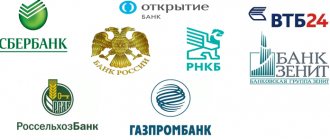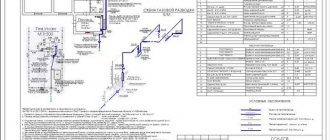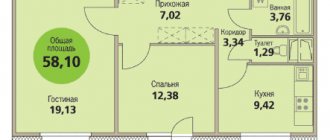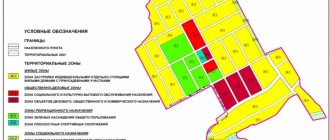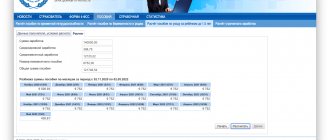Home/Military mortgage/How to find out savings?
On January 1, 2005, Federal Law No. 117 of August 20, 2004 came into force, which introduced the concept of “savings-mortgage system” (NIS). Its purpose is to provide living space for military personnel. Thanks to the Military Mortgage program, people defending their homeland can get their own apartment, and all costs associated with its acquisition are borne by the state. Funds intended for these purposes are deposited in special accounts. Therefore, military personnel are faced with the question of how to track their savings in the Military Mortgage program and how they can be used.
What are military personnel's personal savings?
A person who decides to enlist in the Russian army can become a participant in the Military Mortgage program. To do this, it must meet the requirements specified in 117-FZ. Inclusion in the program is made upon written request from the employee. If the department’s response is positive, a separate personal account is opened for the person in a bank accredited by the Ministry of Defense. Quarterly payments are made from the federal budget.
Attention
The transferred amount is adjusted annually based on the level of inflation. It does not depend on salary, rank or position. This figure is the same for everyone. The maximum deduction period is 20 years.
A person can use this money only after three years of conscientious service after registration with the NIS. This procedure is provided for in paragraph 1 of Article 14 117-FZ. If a serviceman retires, his participation in the Military Mortgage program is automatically terminated and the savings account is cancelled.
How to find out your registration number for participation in NIS?
Once a person enters the service, his data is entered into the list of NIS participants. Each person is assigned an individual registration number. The rules for maintaining such a register are regulated by Decree of the Government of Russia No. 89 of February 21, 2005.
After entering the information into the database, the registration authority generates and sends a notification to the participant about his inclusion in the program. This paper also contains a registration number, by which you can later track your savings in the Military Mortgage program.
IMPORTANT
According to the order of the Ministry of Defense No. 474 dated August 3, 2017, the data from the notification is entered into the employee’s personal card. Attaching such information to your personal file becomes mandatory.
Thus, you can find out your number to clarify your savings in the Military Mortgage program from a notice or personal file. If the message about participation in the program has not reached the employee and the personnel department, you will have to personally contact the Regional Housing Administration assigned to the place of duty.
How is a mortgage divided in a divorce?
An apartment purchased during marriage with money from the Ministry of Defense is not subject to division. You can only divide the amount that was invested in a military mortgage from personal savings. They divide either 50/50 or in the proportion specified in the marriage contract.
Property disputes are resolved in three other legal ways:
- The apartment is sold at auction, the husband and wife pay off the debt to the state with the money from the sale, and the rest of the money is divided.
- Each spouse takes out a loan for the allocated share of the apartment and pays it off independently.
- The housing is completely transferred to one of the spouses and he pays the second spouse the cost of his share.
How are accruals made?
The sources of funds transferred to the personal accounts of military personnel are:
- Contributions from the federal budget.
- Income derived from investment activities.
- Other receipts that do not contradict the norms of current legislation.
Funds are transferred from the budget quarterly. Accounting for these funds begins on the first day of the month following the date of account opening. Income received by investing money is transferred once a year. This procedure is established by Article 5 117-FZ.
How to control the receipt of funds to a personal account?
Attention
Responsibility for crediting funds to the personal account of NIS participants rests with the Federal State Institution “Rosvoenipoteka”. It is this department that you should contact to receive information about the receipt of money.
In order to find out the savings in the “Military Mortgage” program, do the following:
- A request for information about the status of a personal account is made in writing.
- The paper is sent to the official postal address of Rosvoenipoteka. This is done by registered mail with notification or using a courier service.
- They are waiting for a written response from the department. The maximum period for receiving information in this case is 30 days.
You can speed up and simplify this process by contacting the commander of the unit in which the person is serving. It is necessary to give him a rapport with a request to provide data from his personal account.
The Ministry of Defense of the Russian Federation also ensures that all military personnel receive information about their savings in the Military Mortgage program. To do this, no later than March 31, it requests the necessary data from Rosvoenipoteka and, over the next two weeks, sends out relevant notifications to all military personnel included in the program.
Is it possible to bankrupt a military man, and how does it work in reality?
According to norms No. 127-FZ, the debtor himself or his creditor can file for bankruptcy.
The bank has the right to file an insolvency petition with the court if:
- the amount of debt is more than 500 thousand rubles;
- the delay has reached 3 months.
In reality, they begin bankruptcy of an individual with an amount of over a million rubles, and when the debtor has assets to sell.
Extrajudicial bankruptcy through the MFC is not suitable for military personnel, because they have a stable income. A mandatory condition for free bankruptcy at the MFC is the closure of enforcement proceedings due to the lack of income and property for collection. As long as there is a salary, the bailiff will not close the case.
How does bankruptcy work?
There are two procedures used in judicial bankruptcy:
- Debt restructuring - the procedure involves drawing up a plan to repay the debt. The maximum return period is 3 years. Instead of bank interest, the Central Bank discount rate is used. You need a stable income, which will be enough to pay off claims and meet your own needs for 3 years. The debtor’s property will not be damaged; after the implementation of the restructuring plan, the person is not considered bankrupt, and the consequences (prohibitions on doing business and holding managerial positions) do not apply to him.
- Sale of property - the procedure involves recognizing financial insolvency and writing off debts. A bankruptcy estate is formed, which includes the debtor’s property for sale. A check is carried out for signs of a citizen’s dishonesty when receiving loans, concealment of property, fictitiousness and premeditation of bankruptcy. The property is sold, the proceeds are used to pay off creditors, the remaining debts are written off, and the person is freed from the need to repay them.
What property is included in the bankruptcy estate for sale at auction? They take away property worth more than 10 thousand rubles. Objects that are necessary for life are not confiscated:
- the only dwelling and the plot below it;
- household items, furniture, household appliances, personal belongings;
- awards, memorial signs.
Also, during bankruptcy, the personal property of the spouse and children is not taken away.
In practice, the bankruptcy estate includes movable and immovable property that was registered or registered with the state. authorities: weapons, vehicles, boats, ATVs, helicopters, real estate (except for single housing). They do not take away the mortgaged housing if the serviceman continues to serve under a contract, and the contributions are paid by Rosvoenipoteka.
If you have several real estate properties (for example, two apartments), it is better to contact lawyers for help in advance. As part of the preparation for bankruptcy of individuals, the lawyer will allocate the shares of the spouses. This will protect valuable property from inclusion in the bankruptcy estate and further sale.
If you want to avoid the sale of property, then in relation to military personnel, the courts quite often introduce debt restructuring. The court will approve a plan mandatory for banks and other creditors, according to which a person pays off debts in 3 years.
- The plan will be approved if it is possible to repay more than 50% of the principal debt in 36 months (penalties, commissions and interest are not considered).
- During the restructuring, creditors will be guaranteed to receive monthly payments - they will be allocated directly from the debtor’s military security. In this case, there will be no arrests, blocking of accounts or sale of property.
- Restructuring involves payment of obligations, so a person is not considered bankrupt.
Do you need detailed legal advice regarding military bankruptcy? Contact us. Our lawyers will help you protect your home, payments, and write off your loans without loss in a convenient time frame.
How can I find out how much money has accumulated under the “military mortgage” by registration number?
For the convenience of citizens, a functionality has been introduced on the Rosvoenipoteka website that allows you to find out the status of a personal account within a few days . To obtain information about savings on a military mortgage, perform the following actions:
- Go to the official website of Rosvoenipoteka.
- In the upper right corner find the “Personal Account” tab. If a person is visiting the site for the first time, he will have to register. To do this, just enter your full name, registration address, create a password, and indicate your email. Those who have previously created an account will only have to log in to it.
- After logging into your personal account, go to the “Requests” tab.
- A window for entering data will appear on the screen. It includes the registration number, start date of participation in the program, as well as the email address to which the response will be sent.
- At the end, the type of request “Amount in personal savings account” is indicated.
- Click on the “Send request” button.
All that remains is to wait for the answer. On average, this procedure takes from 5 to 10 days.
How to find out savings by certificate number?
Three years after the start of participation in the Military Mortgage program, a serviceman can receive a certificate confirming the right to purchase housing. From this document you will also be able to find out the amount of accumulated money. In order to find out the savings on a military mortgage using the certificate number, do the following:
- A rapport is drawn up, which indicates the personal data of the serviceman: full name, position, rank, passport details, as well as the start date of participation in the program and registration number.
- The report is transmitted to the unit commander.
- Waiting for the certificate to be issued. Typically, this process takes 2 to 3 months.
- From the received certificate they will find out the amount of accumulated funds on the military mortgage.
Attention
It is important to remember that you must use the received paper within six months. During this time, the serviceman must select an apartment, send an application to the bank and, if the decision is positive, apply for a mortgage.
Certificate of entitlement to a loan
The serviceman is entered into the NIS register and waits 3 years to use the money in the account. The time is approaching, and now you need to submit a report addressed to the head of the unit in order to receive a certificate of entitlement to a targeted housing loan. The certificate is issued in approximately 3 months. It will be required by the bank when applying for a mortgage.
Don’t delay your search for housing, because the issued certificate is valid for six months. If a program participant does not have time to use the money from the account, he will have to request a new certificate.
Is it possible to withdraw savings from a military mortgage?
If a serviceman does not need a mortgage, then Article 11 117-FZ allows him to use the accumulated funds under the Military Mortgage program at his own discretion. But this is only permissible in the following cases:
- The total service life of a person exceeded 20 years, taking into account preferential calculations.
- The person resigned from service provided that he had previously worked for more than 10 years. Moreover, the reason for dismissal should be health status, reaching the age limit for serving in the army, organizational and staffing measures, family circumstances provided for by Russian legislation.
- Death of a soldier. In this case, the heirs can receive the savings.
- Leaving the army for health reasons, provided that the person is declared unfit for service as a result of a specially organized commission.
If such circumstances exist, the serviceman must draw up a report addressed to the unit commander. After receiving a positive answer, he will only have to contact the bank and withdraw the accumulated funds under the “military mortgage” from his personal account.
How to use savings for a military mortgage?
Article 14 117-FZ describes the procedure for using funds accumulated in the account. You can spend them as follows:
- For the purchase of residential premises, a house with land or a share in a house.
- Purchase of living space under an agreement for participation in shared construction.
- Payment of a down payment when taking out a mortgage loan or repayment of obligations in a larger amount on such a loan.
You can use the accumulated funds after receiving a certificate from Rosvoenipoteka. The scheme of further actions is as follows:
- Select one or more banks to which the application is submitted. At the first stage, it will be enough to provide a passport, military ID, or NIS certificate.
- They are waiting for a decision from financial companies. Choose the most advantageous offer.
- They collect a complete package of documents for obtaining a military mortgage. It includes papers for the selected property, a purchase and sale agreement with the seller, and others. The complete list depends on the policy of a particular bank.
- If the selected housing meets the requirements of the bank and the military mortgage program, then they proceed to signing a loan contract. The contract is sent to Rosvoenipoteka for approval.
- The signed contract is returned back to the bank. At the same time, Rosvoenipoteka transfers funds to the lender as a down payment.
- The serviceman completes the transaction and registers ownership of the home. He must provide the bank with documents confirming his ownership of the apartment.
- The bank sends the necessary papers to Rosvoenipoteka, and the borrower is given funds to pay for the property.
After all operations, Rosvoenipoteka will make all loan payments on a monthly basis.
Pros and cons of bankruptcy for military personnel
Military personnel take out apartment mortgages using a special lending program. If citizens go to commercial banks and take out mortgages on general terms, then the military turns to Rosvoenipoteka. This is a state government institution that pays the bank monthly mortgage payments while the citizen serves in the RF Armed Forces.
As a result, military personnel receive housing on a mortgage, but payments are made by the state. While a person is serving under a contract, the mortgage agreement remains in force, and bankruptcy does not change anything. What are the advantages of bankruptcy for military personnel?
The serviceman's income will decrease slightly
A serviceman's monetary allowance consists of salary, incentives and compensation payments. And the latter, by law, do not collect for debts, even if they constitute a significant part of the income.
For example, if a civil individual applies for bankruptcy, then during bankruptcy the person receives income in the amount of the minimum wage in the region, social benefits and payments, and child support. In case of bankruptcy, a military serviceman receives all compensation payments in addition to the minimum wage.
A soldier's salary includes:
- salary;
- additional payments for performing tasks that involve risk;
- additional payments for exercises;
- additional payments for military training tasks outside the deployment;
- regional coefficients for military service;
- additional payments for special achievements;
- bonuses for conscientious performance of tasks;
- monthly allowances for special conditions.
Additional payments often form the basis of the military’s monetary support, but in bankruptcy the financial manager will take only the salary and the incentive portion. The person is left with a monthly payment in the amount of the subsistence minimum for himself + each of his dependents, if any, + all compensation payments. That is, during the procedure, a person will receive almost the same income as before bankruptcy.
After the debts are written off, the restrictions are lifted, and the monetary allowance will be transferred in full.
Possibility to save mortgaged housing
The bank that issues a mortgage to a military personnel receives payment from Rosvoenipoteka, and not personally from the debtor. In such circumstances, the bank will not participate in bankruptcy - there are no claims against the debtor. The apartment remains with the serviceman as long as he is in the ranks of the Armed Forces of the Russian Federation.
Are there any downsides to bankruptcy for a military member? Is it possible to dismiss a military man on the basis of overdue loans?
It is more difficult to collect documents
- There is no work record that needs to be attached to the bankruptcy application.
- The risk of contract disclosure if the employment contract contains military secrets (you need to look for a financial manager with the same clearance category).
- Delays in obtaining the 2-NDFL certificate, which will also be required for the Arbitration Court. It must be ordered from the Unified Settlement Center of the Ministry of Defense of the Russian Federation. Pension accruals are transferred to a special fund, and not to the Pension Fund, so the certificate will have to be obtained in a non-standard way.
The issue of dismissal
Who is a financial managerRelated article
There are situations when military personnel are fired for unsavory actions. For example, for being brought to law enforcement agencies, for public unethical actions.
Law No. 127-FZ On Bankruptcy does not prohibit military personnel from writing off overdue loans in court or out of court. And the recognition of bankruptcy of individuals is not a misdemeanor, crime or indecent act discrediting the honor of the uniform within the meaning of paragraph 67 of Decree No. 1495.
By law, you cannot be fired or demoted for bankruptcy. Moreover, if they try to fire a military man during bankruptcy, his interests will be protected by the financial manager, because it is more profitable for creditors and society for the person to work.
In 2021, bankruptcy of individuals has become more common, and management does not risk dismissing an employee on formal grounds - if there are no complaints against the person, he will not be fired for bankruptcy.
What contributions must be made on a military mortgage?
After processing a mortgage loan, all responsibilities for paying monthly installments fall on the shoulders of Rosvoenipoteka. Every month, 1/12 of the amount of annual accruals to the military personnel is transferred to the bank account. Thus, a person gets the opportunity to purchase living space entirely at the expense of the state. But there are several nuances here:
- If, after obtaining a military mortgage, a person leaves service without working for a total of 10 years, then he is obliged to return all the funds allocated to him. In this case, he must repay the rest of the loan himself. Repayment must be made within a period of no more than 10 years from the date of dismissal. This rule is provided for in paragraph 2 of Article 15 117-FZ.
- When a person retires after serving for more than 10 but less than 20 years, he does not have to return anything to the state, but he will have to make further monthly mortgage payments himself.
- If the dismissal of a person who has served for more than 10 years occurred on preferential grounds, then the remainder of the loan for him is paid by Rosvoenipoteka. The list of valid reasons is given in Article 11 117-FZ.
But this does not mean that the serviceman will not have to pay anything when receiving a mortgage. All additional costs associated with registration of real estate ownership fall on his shoulders. Mortgage insurance, mandatory under 102-FZ dated July 16, 2008, will also have to be paid for independently.
"Military" mortgage vs. bankruptcy, or How a serviceman saved his mortgaged housing
Any lawyer who has at least once dealt with the bankruptcy of individuals understands that the debtor most likely will not be able to save the “mortgage” apartment. And the status of the only home will not affect the outcome of the case in any way. However, I was able to discover one interesting exception. After him, I would not answer the question about the impossibility of saving mortgaged housing so categorically. However, let's take it in order.
Act one. Start.
In October 2021, the debtor filed for bankruptcy. The court considered his claim and introduced bankruptcy proceedings in February 2019.
Next, creditors began to be included in the register. The main one among them was the bank PJSC AKB Svyaz-Bank (hereinafter referred to as the Bank) with a claim amounting to just over 2 million rubles. The court recognized his claims as justified and included them in the register as secured by a pledge (mortgage) of the apartment. It would seem that nothing is surprising.
The debtor himself was not an ordinary citizen, but was an active employee of the Armed Forces of the Russian Federation. At the time he was declared bankrupt, he did not lose his “military” status and continued to work throughout the entire procedure.
Like most military personnel in our country, the debtor took advantage of the right to receive housing under the preferential program of targeted housing loans issued by the Federal State Institution "Rosvoenipoteka". The essence of the program is quite simple: a military man chooses his own housing and enters into a loan agreement with the bank. The bank's requirements are secured by a housing mortgage. FGKU “Rosvoenipoteka”, in turn, provides him with a loan, with the help of which the military man pays the down payment for housing.
Subsequently, the organization itself monthly transfers to the bank the remaining amount of the debt under the loan agreement. However, only as long as the person is in service. If he suddenly decides to leave the Armed Forces early, the money transferred for him will have to be returned, and the loan debt will have to be repaid on his own.
This is what the “military” mortgage program looks like in a simplified form. For those interested, read the Federal Law of the Russian Federation dated May 27, 1998 N 76-FZ “On the status of military personnel” and the Rules for providing targeted housing loans to participants in the savings-mortgage housing system for military personnel.
Let us now return to bankruptcy.
Act two. How the Federal State Institution "Rosvoenipoteka" was not allowed into the register
Apparently realizing that the debt to Rosvoenipoteka would also be “written off” in bankruptcy, like other debts, the organization hastened to be included in the register of creditors’ claims. However, the court, with its ruling, blocked her path.
Why and how? The court's reasoning is simple and elegant. In short, it comes down to this:
a) The obligation to repay a targeted loan arises only when a military serviceman is excluded from the register of participants in the mortgage-savings system;
b) The law establishes a closed list of grounds when a military serviceman can be excluded from the register of participants in the mortgage savings system;
c) The introduction of bankruptcy proceedings against a military personnel is not among these grounds. Accordingly, the Federal State Institution “Rosvoenipoteka” does not have the right to be included in the RTK.
The text of the definition can be found in the appendix. The appeal, by the way, later agreed with this argumentation and left the definition unchanged.
This is how the first step was taken towards saving the “mortgage” apartment.
Act three. About how the bank was thrown out of the register
It is quite natural that after FGKU Rosvoenipoteka was not admitted to the register, it was necessary to exclude the key creditor, PJSC AKB Svyaz-Bank, from the register of claims. It is worth noting that this was also expected by Rosvoenipoteka itself, which supported the debtor’s demands in full.
The court's ruling to exclude the Bank from the register almost completely duplicates the ruling to refuse to include Rosvoenipoteka in the register. Therefore, it is not worth dwelling on its contents in detail.
Here the court once again duplicated one interesting passage, previously reflected in the ruling on Rosvoenipoteka. It seems to me that the court gave a fairly comprehensive justification for the primacy of “housing” standards over “bankrupt” standards in this particular case.
“The norms of the legislation on bankruptcy of an individual do not create conditions for changing the deadlines for fulfilling obligations determined by special rules governing housing provision for military personnel of the Russian Federation.
Otherwise, it would mean a repeated procedure for the sale of state guarantees in favor of a person who is a participant in the savings-mortgage system and an active military serviceman, according to whose obligations, according to the appealed definition, is subject to sale initially.”
It is surprising that the Bank did not even try to challenge the determination and did not go to appeal.
Act four. Saving a mortgaged apartment
The final step in this case was the exclusion of the apartment from the debtor's bankruptcy estate. The rationale given here is quite clear and predictable. The terms of the loan agreement have not been violated, the apartment is the only housing, and therefore subject to exclusion from the bankruptcy estate.
As a result, the bankruptcy procedure was completed, the remaining debts were successfully written off. End.
The texts of all the above judicial acts can be found in the appendix. Nice reading!
case No. A40-236729/18-46-260 F AS Moscow
